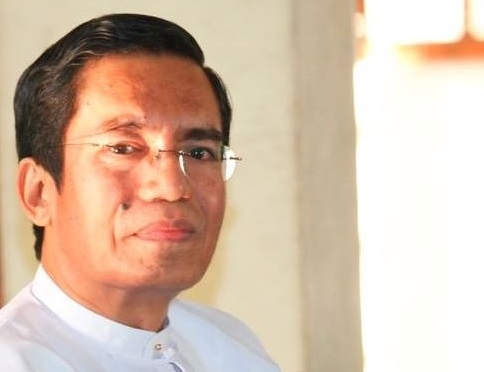A longtime former Reuters correspondent has been appointed as Burma’s deputy information minister in an awkwardly timed career move, given that two of the international news agency’s Burmese reporters are currently on trial for what their boss has called “a blatant attack on press freedom.”
Aung Hla Tun, who worked at Reuters for more than two decades and more recently was serving as deputy chairman of the Myanmar Press Council (MPC), will now report to Union Information Minister Pe Myint.
Adding to the interpersonally labyrinthine dynamics of the new order, one of the two Reuters reporters currently in custody previously worked under Pe Myint when the two shared a newsroom at the People’s Age, a weekly journal. Wa Lone, who worked at the People’s Age from 2012-13 during a period when Pe Myint was the news publication’s editor-in-chief, was hired by Reuters in 2016 and was detained by authorities along with his colleague Kyaw Soe Oo last month.
They are both facing charges under the colonial-era Official Secrets Act after they were arrested on 12 December, allegedly in possession of sensitive government documents.
Myint Kyaw, a member of the MPC, told DVB that Aung Hla Tun would have to step down from his role at the council. His successor has not yet been named and will be discussed at the next MPC meeting, Myint Kyaw added.
Aung Hla Tun later told DVB that he officially resigned from the MPC on Tuesday. He declined to take questions about his new cabinet position.
The MPC was formed in 2012 to serve as an independent adjudicating body for media-related matters. Its chair is the veteran journalist Khin Maung Lay.
Regarding the high-profile case of the two Reuters journalists detained last month, Aung Hla Tun previously told DVB that “the image of the country has been affected by this case. More pressure from the international community will come.”
Following the reporters’ arrest, the MPC released a statement on 20 December: “If necessary, the Myanmar Press Council is willing and ready to provide legal assistance for the accused reporters so that justice would be served.”
Reuters has been at the forefront of reportage on the latest crisis in Rakhine State, where press access has been severely restricted since late August, and some have speculated that the two journalists’ arrest is linked to their work there.
Aung Hla Tun, who left his job at Reuters in 2016, succeeded Pe Myint as deputy chair of the MPC. In addition to the ministerial position he assumed in 2016, Pe Myint is part owner of Pyithu Ayay, a weekly journal that roughly translates to “the people’s cause” and focuses on politics.
Thiha Saw, the MPC’s current secretary, told DVB on Tuesday that Aung Hla Tun’s replacement on the council may not be decided for several months.
“The council will hold new elections before October. So, the council won’t replace Aung Hla Tun’s seat [until then],” he said.
Thiha Saw added that he had high hopes for the future of press freedom in Burma with Aung Hla Tun serving as deputy information minister. The MPC secretary said Aung Hla Tun had consistently criticised government restrictions on the media, dating back to the administration of former President Thein Sein.
“The right to information is very important for journalists. We have a draft to amend the Media Law and already sent it to the relevant parliamentary committee and ministry. I believe that Aung Hla Tun will try to amend the Media Law,” Thiha Saw said.
But where the international media, at least, may view that optimism with scepticism is in regard to Aung Hla Tun’s added value as a government official when it comes to Rakhine State.
[related]
He has in the past spoken out against international news outlets’ reporting of the conflict-plagued region, calling their coverage sensational and commercialised in an interview with The Irrawaddy last year.
State media looked to him in November to chastise The Associated Press, which misquoted State Counsellor Aung San Suu Kyi at a gathering of Asian and European leaders in a story that tied remarks about illegal migration and conflict to recent months’ mass exodus of Rohingya Muslims from Rakhine State. The state-run Global New Light of Myanmar used a Q&A with the then vice chairman of the MPC to bolster its argument in an unusually blistering attack on the news agency, which it mounted on Page 1 of the daily’s 22 November edition.
With additional reporting by Ye Mon



